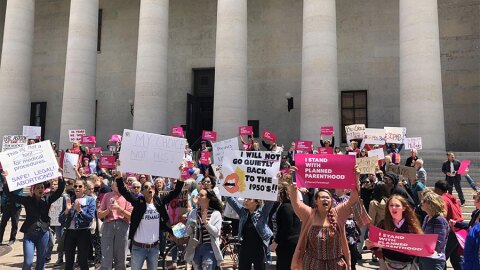A federal judge has temporarily blocked Ohio from banning surgical abortions as part of state restrictions on non-essential procedures during the coronavirus pandemic.
ACLU of Ohio, Planned Parenthood and a group of abortion providers in Ohio filed a federal lawsuit Monday seeking to define abortion as an "essential" procedure, allowing clinics to continue operating during the coronavirus pandemic.
"Abortion care is essential because it cannot be delayed without risking the health and safety of the patient," reads the complaint, which was filed March 30 in the U.S. District Court for the Southern District of Ohio.
U.S. District Court Judge Michael Barrett granted a temporary restraining order in a ruling late Monday. For the next 14 days, Ohio officials cannot use the COVID-19 health order barring elective surgery to stop or restrict surgical abortions.
"Enforcement creates a substantial obstacle in the path of patients seeking pre-viability abortions, thus creating an undue burden on abortion access," the ruling reads.
The judge ordered that abortion providers must determine on a case-by-case basis if a surgical procedure can be safely postponed to save resources. If it can't be delayed because of timing or other medical conditions, the procedure should be deemed "legally essential to preserve a woman's right to constitutionally protected access to abortions."
Is Abortion Essential?
Earlier this month, Ohio Department of Health director Amy Acton issued a public health order to cancel all "non-essential or elective surgeries or procedures" that utilize personal protective equipment (PPE). Acton said the move was necessary to save hospital gear for an expected surge of coronavirus patients.
"A non-essential surgery is a procedure that can be delayed without undue risk to the current or future health of a patient," the order specifies.
Although it doesn't specifically name essential procedures, the guidelines lists four qualifiers: those that can save a life, preserve a limb or organ, prevent metastasis of a disease, or reduce risk of more severe symptoms.
Plaintiffs say surgical abortions are the only available method for patients after 10 weeks of pregnancy.
"Some of these patients will be forced to carry pregnancies to term against their will and at risk to their health amidst a health system overburdened by responding to COVID-19," the suit reads.
Beginning March 20, Ohio Attorney General Dave Yost began sending letters to Planned Parenthood of Greater Ohio, Planned Parenthood of Southwest Ohio and the Women's Med Center of Dayton ordering them to halt surgical abortions using PPE.
"If you or your facility do not immediately stop performing non-essential or elective surgical abortions in compliance with the attached order, the Department of Health will take all appropriate measures," the letter reads.
Planned Parenthood and other clinics were defiant, telling the Attorney General they were already following the order and would remain open. The Ohio Department of Health then sent inspectors to the three clinics to investigate their compliance, but did not say if any violations were found.
Monday's lawsuit asks the federal court to intervene.
"Without any clear guidance from the ODH and in light of the statements of the Director, Governor, and Attorney General and the actions of ODH, Plaintiffs and their physicians credibly fear being immediately shut down and prosecuted if they continue to provide surgical abortions," the suit reads.
Abortion providers argue that surgical abortions use little PPE, and do not take up specialized N95 respirator masks. The lawsuit also says that when appropriate, patients are referred for medication abortions, which don't require PPE at all.
The American College of Obstetricians and Gynecologists and other medical groups have said that abortions should not be canceled or delayed as part of a coronavirus response.
"Abortion is an essential component of comprehensive health care," the statement reads. "It is also a time-sensitive service for which a delay of several weeks, or in some cases days, may increase the risks or potentially make it completely inaccessible. The consequences of being unable to obtain an abortion profoundly impact a person’s life, health, and well-being."
Judges in Alabama and Texas have blocked similar orders from limiting abortion access.




